Savers uniting from Middlesbrough to Wythenshawe!
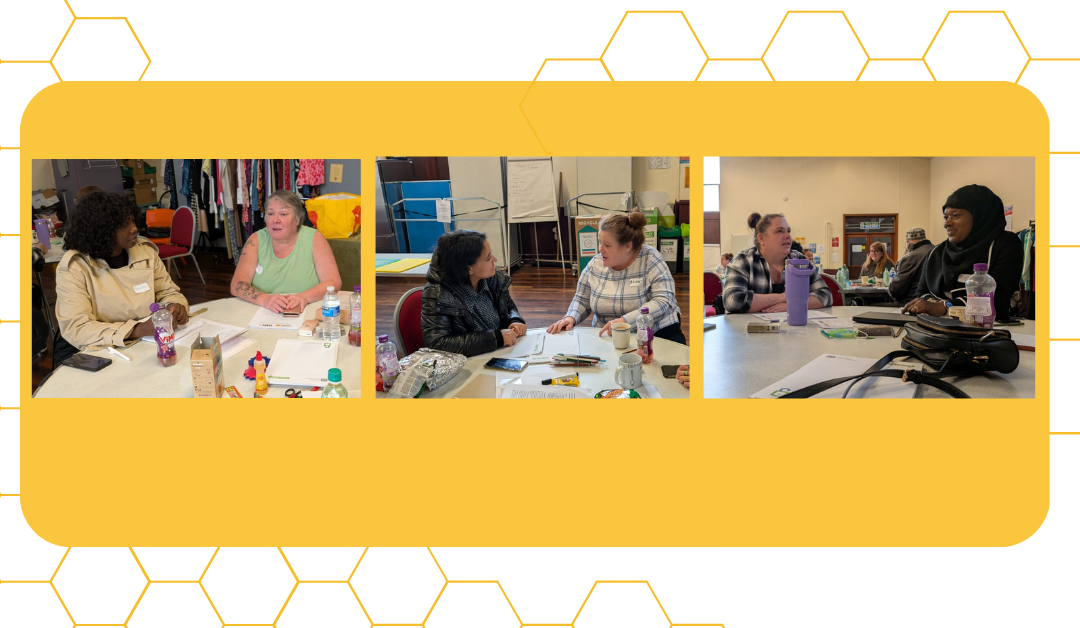
Community Savers leaders had another productive quarterly network meeting on Thursday and were delighted to welcome Rama, Fatima, and Mabintou from Middlesbrough!
Rama is coordinator for a CIO called Creative Minds Middlesbrough and is working with local women to learn from the Community Savers approach and set up their own savings group.
Leadership development, sharing learning and peer support are fundamental pillars of the Community Savers methodology and here Lina – a leader form Dandelion Savers and Wythenshawe Central Network shares on what Quarterly Network meetings are all about:
After a jam-packed morning full of Community Savers business affiliated savings groups from Brinnington, Miles Platting, Hulme and Wythenshawe shared their experiences of setting up and running savings clubs with our Middlesbrough guests. Bridget from MIles Platting Savers reflects on what she was able to share here:
Savings clubs are the building blocks of the Community SAvers approach and contribute significant impacts to financial and social inclusion and wellbeing. For example, our 2024 members survey revealed that:
· 85% of members feel more positive about life
· 81% feel less isolated
· 96% feel more community connection
· 96% saw improved mental health
Community Savers is about much more than saving money however. Through the savings clubs, local residents are able to come together to discuss local issues and soon begin developing their own local initiatives to address gaps and challenges.
Over time, the clubs become organising hubs for a wider network of groups and projects forming neighbourhood networks able to take collective action to reduce inequality and promote a better future for their local area.
For now though, Fathima, Rama and Mabintou will be focusing on getting the hang of getting their new savings club off the ground with support from a shared partner of Community Savers and Creative Minds Middlesbrough – Turn2us https://www.turn2us.org.uk/
Rama visiting from Middlesbrough talking about her experience of attending a Community Saver network meeting.
Fatima from Middlesbrough reflecting on the learning from the day.
Whose City? Whose Plan? Local Plan Consultation now open
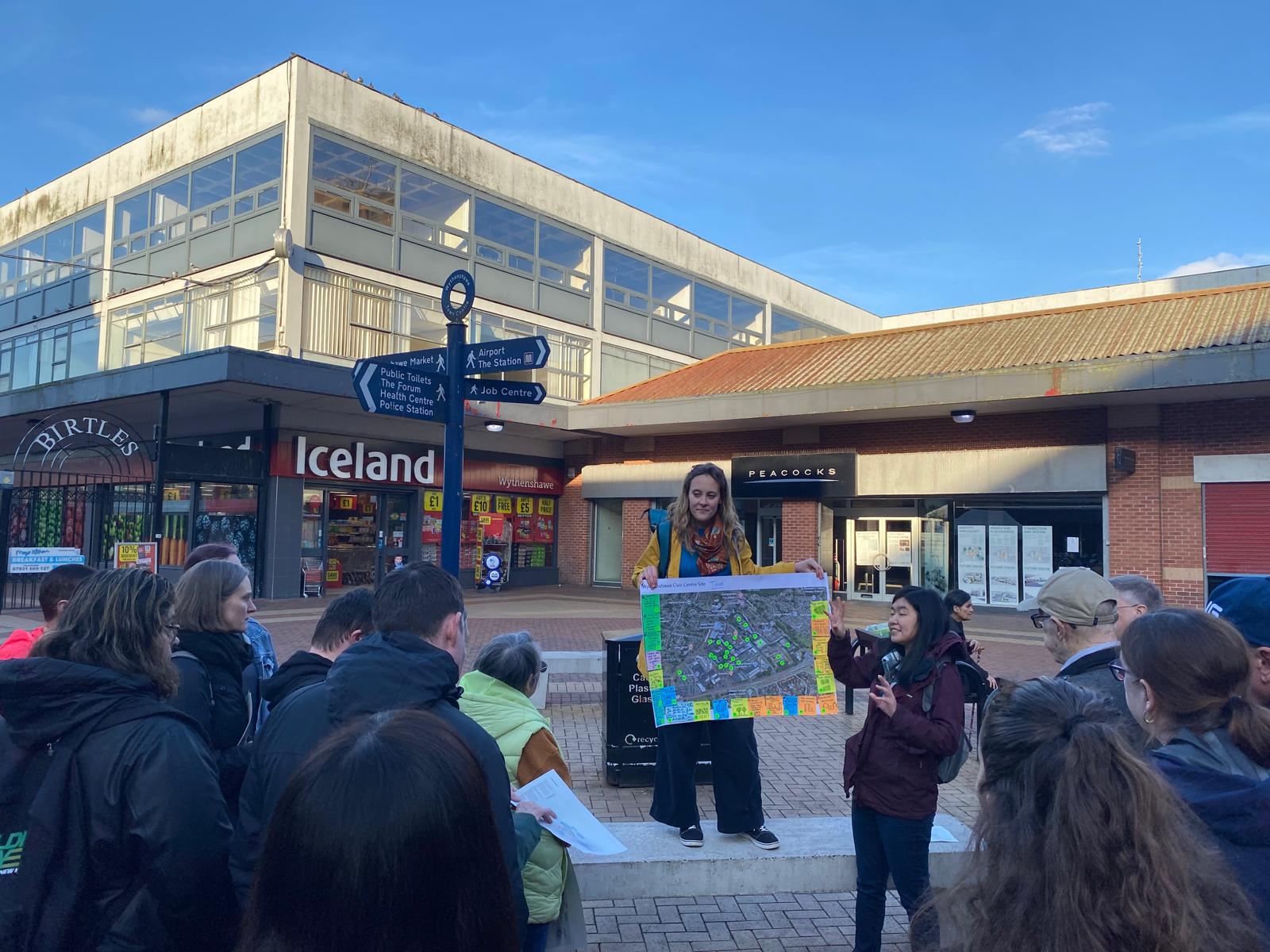
Manchester’s Draft Local Plan out for 10-week consultation
Manchester City Council released their draft Local Plan for a 10-week consultation period on Monday 22nd September. You can access the draft plan with full supporting documentation and submit a consultation response here.
The Council will be holding the following consultation events:
- Wednesday 22nd October, 4pm-7pm – Gorton Hub, 27 Garratt Way, M18 8HE. The hub is on Hyde Road at the junction with Whitewell Way.
- Tuesday 28th October, 4pm-7pm – North City Library, Rochdale Road, Harpurhey, M9 4AF.
- Wednesday 29th October, 3.30pm-7pm – Wythenshawe Forum, Forum Centre, Simonsway, Wythenshawe, M22 5RX.
- Thursday 6th November, 11am-2pm – Central Library, St Peters Square, City Centre, M2 5PD.
- Thursday 6th November, 4pm-7pm – Central Library, St Peters Square, City Centre, M2 5PD.
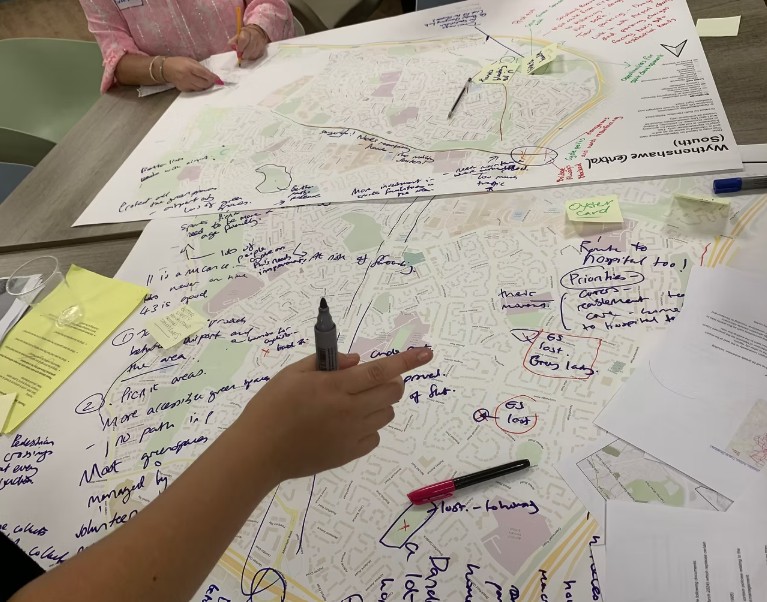
What is the Local Plan? Why should I care?
All Local Authorities must produce a Local Plan. Topics that Local Plans usually cover include housing, employment, green space, and retail. They also identify where development should take place in a city and where development should be restricted.
If you want a say in what can be developed in your local area and the city – you need to know about this!
Local Plans have a long life-span because they take so long to review each time. The last Local Plan in Manchester was published in 2012 and is still the current policy for the city. Some aspects of Planning are still determined by the Unitary Development Plan that was published in 1995!
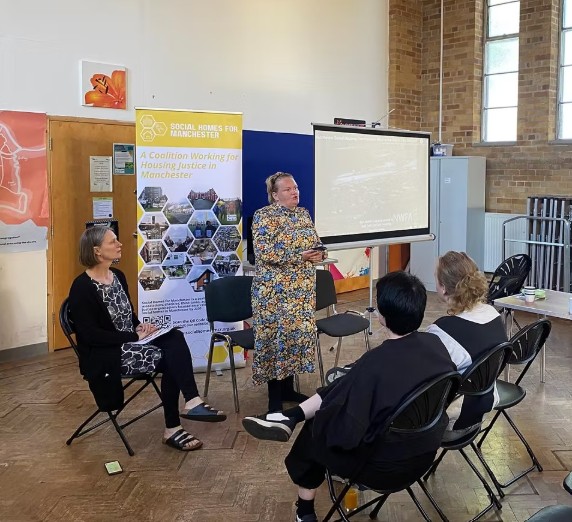
This new Local Plan is likely to continue to shape what kinds of housing (and other facilities) can be developed, and where, for at least the next 10 years.
Why is it so important for Manchester communities to submit a response?
Manchester is at the sharp end of the housing crisis in both availability and affordability. There has been a net loss of more than 16,000 social rent homes to Right to Buy alone since 1979. There are now approximately 20,000 households on the waiting list for a home in Manchester. From 2015 to 2023, the city experienced an 84% increase in the average house price paid and a 61% increase in the average monthly private rent (much higher than the England average). These increases far exceed the 18.7% growth in median hourly earnings in Manchester over the same period, contributing to a situation where 1 in 5 households in Manchester are living in fuel poverty.
While the new Local Plan does introduce some welcome increased targets for affordable housing and housing for social rent, it does not go far enough to address the housing crisis amidst a supportive national and city-regional political and funding environment where £39 billion has been invested in affordable and social housing of which SH4M have learned that approximately £2.5 billion will be invested in Greater Manchester.
It is also important to submit any objections to the plan now to be able to participate in later stages of the decision-making process. The process for passing the Local Plan into policy has several stages. After this initial consultation (called a Regulation 18 consultation) there will be a second version published which will also go out for consultation (a Regulation 19 consultation). Then there will be an Examination in Public.
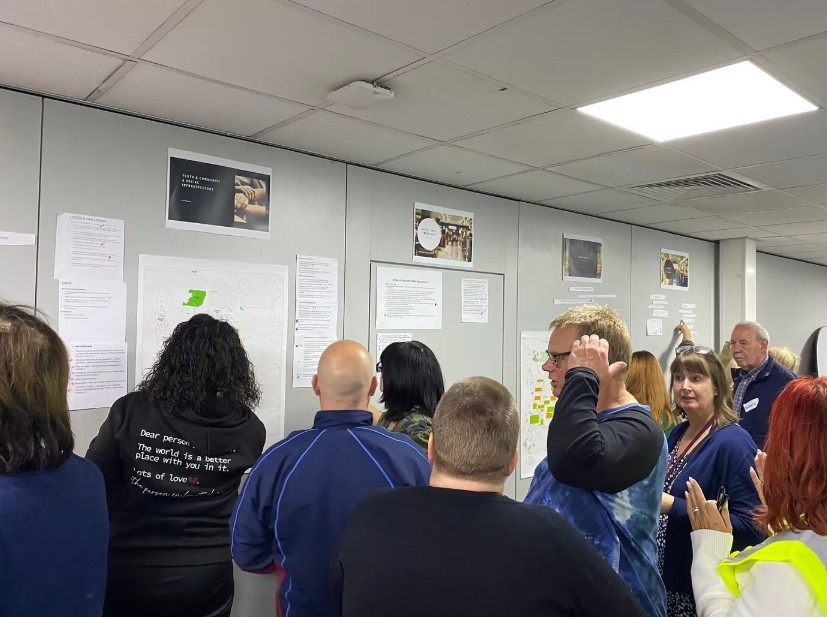
This is a chance for community representatives to address the national Planning Inspector directly at a public event. Only those who have submitted objections during earlier stages of the process will have the right to attend and speak at the public examination of the plan.
At the end of the process, the Inspector will make a recommendation on the Main Modifications required for the Local Plan to pass inspection and be adopted.
As an example, you can view clips from Days 1-5 of an examination of York City Council’s Local Plan from 2018 here. Notice all the white men in suits? This is not what we want to see in Manchester!
But what can I do, really?
This can all feel very technical. You have the power to work together with others and your local councillors to advocate for your community’s priorities for your own local area and for the city. SH4M can help.
Residents and community groups are coming together across the city, within their own neighbourhoods, and to join forces across neighbourhood boundaries, to share their priorities for the homes, communities, and the city they want to live in and co-create.
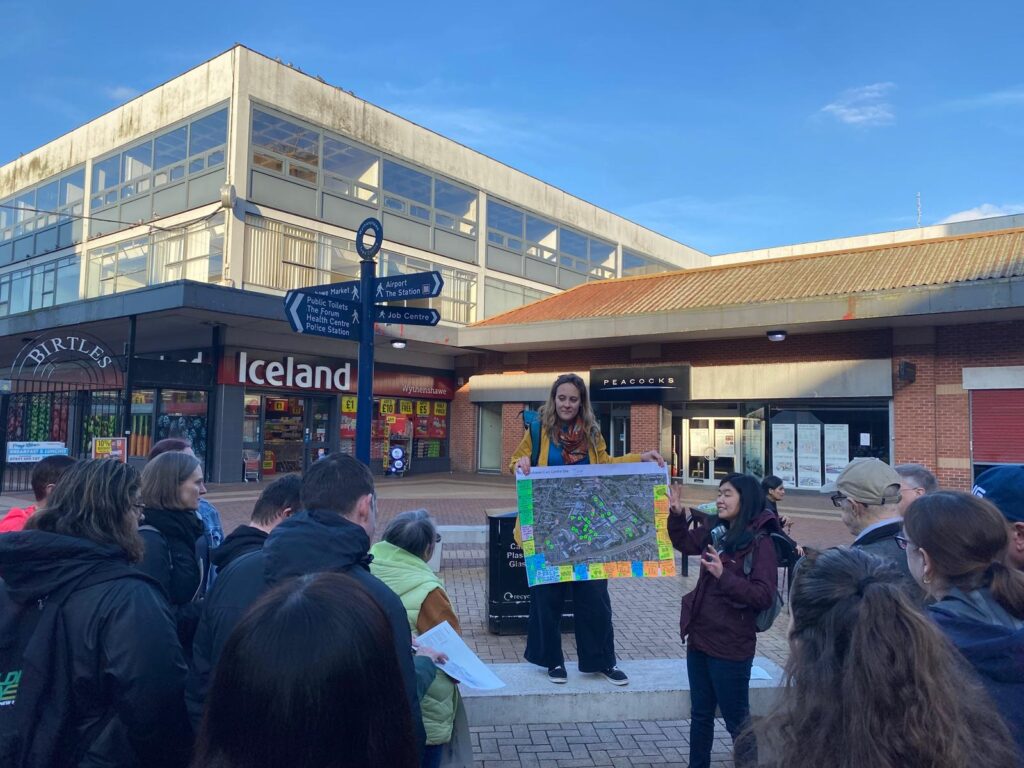
SH4M’s headline request is for Manchester City Council to include a minimum target of 30% social rent in all new housing developments of ten homes or more in the Local Plan. Research evidence tells us this is the minimum amount we need to address the housing crisis. This is possible to do. Other similar cities are setting targets of 40% and 50% social rent.
Here are some suggestions for how you can get involved and advance your own local priorities:
1. Join the campaign: you will receive information, calls to action, and updates on the process.
2. Invite us to run a workshop in your local area: socialhomes4mcr@gmail.com.
3. Engage your ward councillors: they may be interested to work with you to organise a local meeting to discuss priorities for your local area and represent these through a submission to the Local Plan Consultation when it opens.
4. Submit a response to the Local Plan consultation when it opens. There is more information on the MCC website here: https://tinyurl.com/2h7hc46c.
We will be publishing our own local plan consultation response on here soon. If you are signed up to the mailing list we will share this with you in case you would like to support similar asks in your own response.
A busy summer for MPCAN!
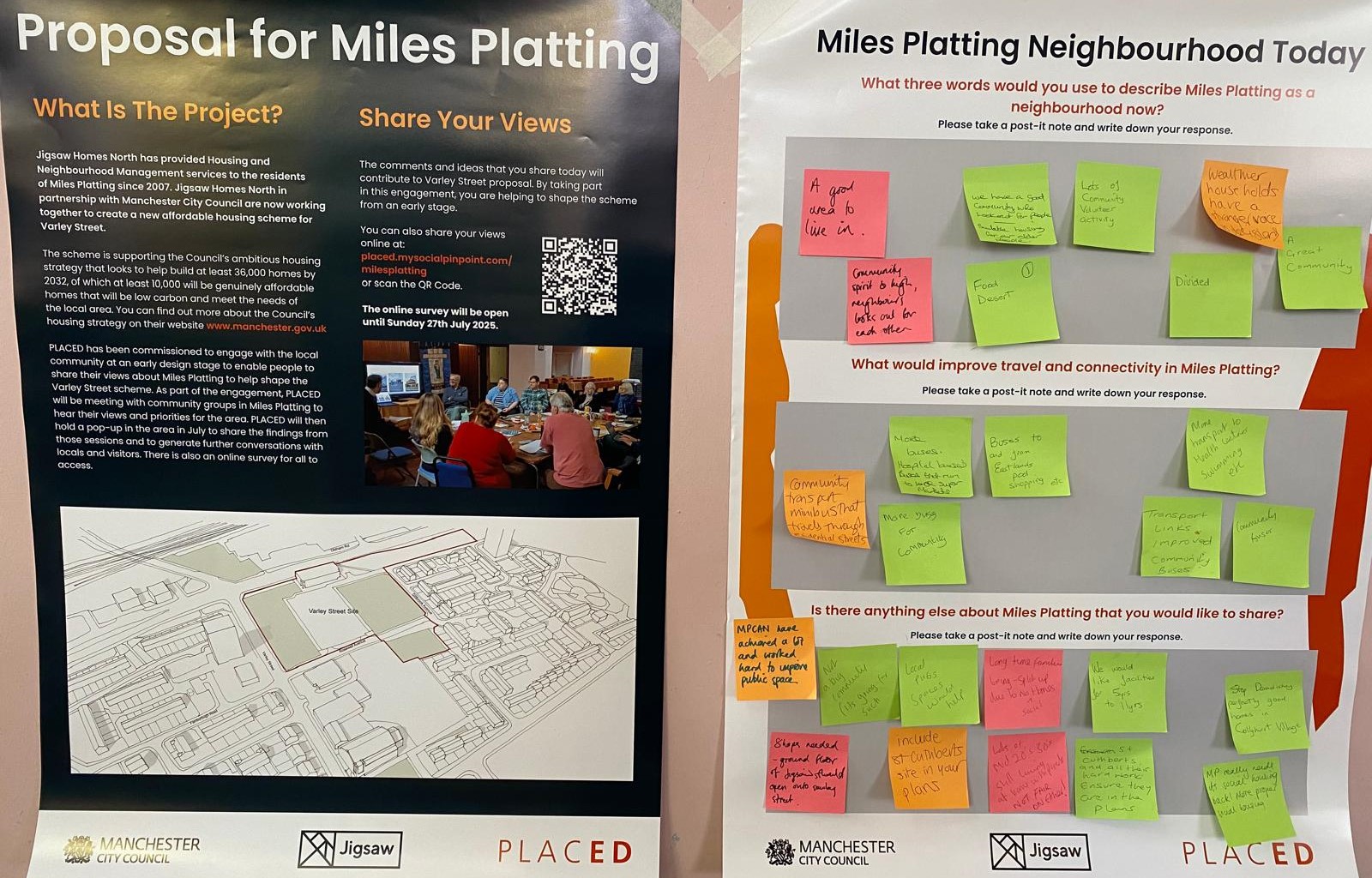
Miles Platting Community and Age-Friendly Network have been busy!
St Cuthbert’s Communities Together
In partnership with the Parochial Church Council, the St Cuthbert’s Action Group successfully set up a new Charitable Incorporated Organisation called St Cuthbert’s Communities Together, which is taking forward the community-led redevelopment of the St Cuthbert’s church. The Board of Trustees are working with architects and applying for further funding to begin working on feasibility studies to take the project forward. Members are hoping that this will provide much-needed facilities including a place of worship, a social hub and bar, a laundrette, health services and housing provision. Plans are underway and this development is shaping up to be an exciting space which will benefit the local community and beyond…
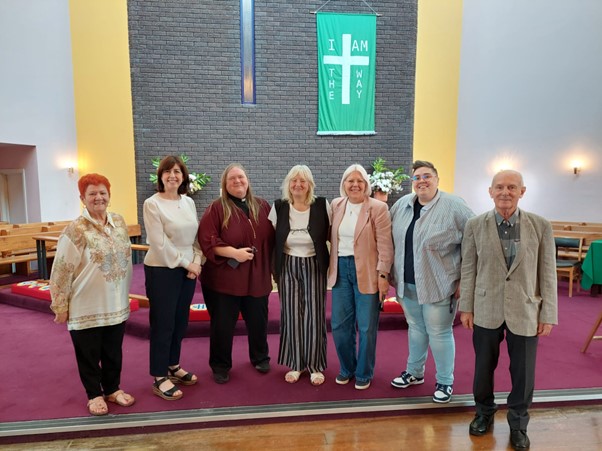
Miles Platting Climate Action
Following their success in creating a Miles Platting Wildlife Corridor through Greater Manchester Green Spaces funding, the Climate Action Group have enjoyed seeing the benefits of interventions across key local green spaces. New trees, hedging, wildlife, flowers & plants have been thriving during the summer and attracting a wide range of biodiversity. Local residents have enjoyed attending local gardening events and look forward to a community orcharding workshop at Chippenham Gardens this Friday 22nd August.
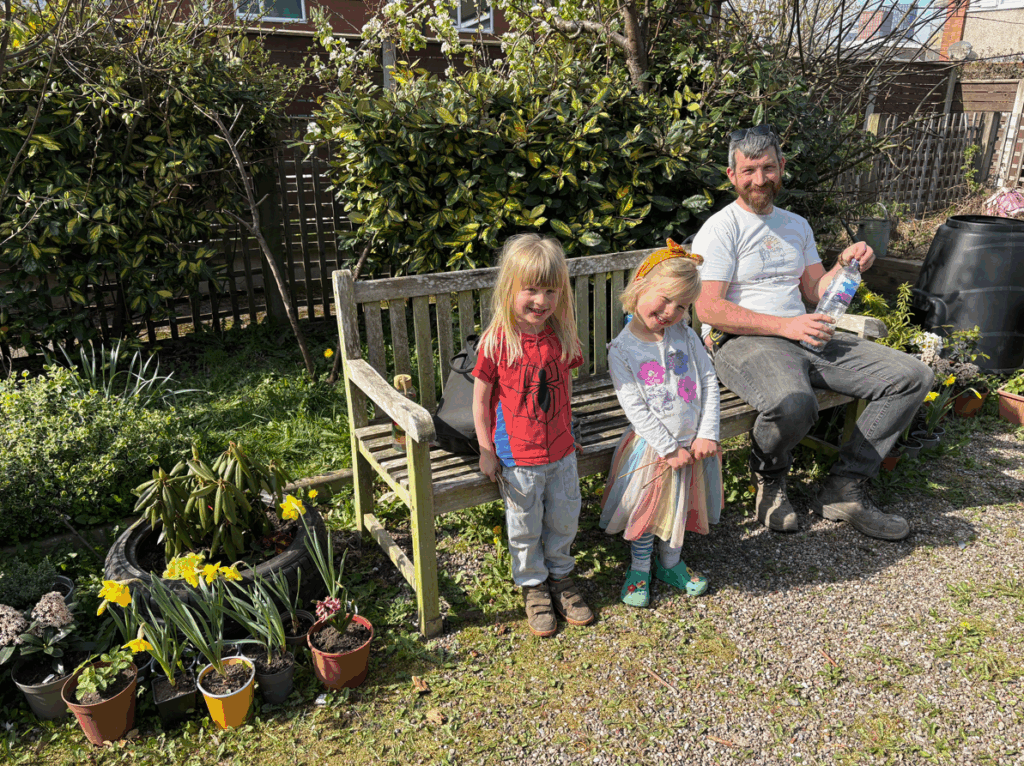
With continued support from Dr Jenna Ashton from University of Manchester and Creative Climate Resilience, the Climate Action Group are looking to fund further improvements, protection, and local engagement across Miles Platting’s green spaces.
Social Homes for Miles Platting
The Social Homes for Miles Platting campaign has been making headway as MPCAN members have been meeting with their local councillors and MP to advocate for increased numbers of social homes. MPCAN’s Anuual General Meeting in July also included a consultation led by PLACED, the community engagement team on upcoming local developments in partnership with Jigsaw Homes.
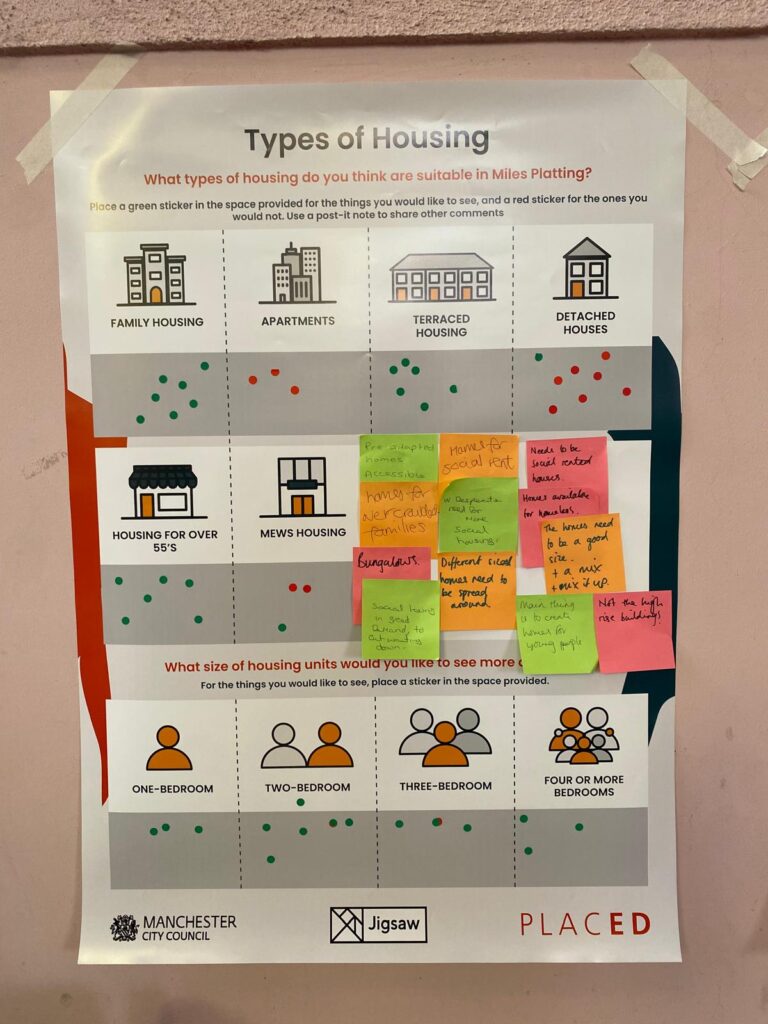
The wider Social Homes for Manchester campaign saw a big step forward as Manchester City Council (MCC) passed a motion to increase social and affordable housing targets in the city. Where the 2012 policy said that only 5% of new housing developments of 15 homes or more had to be social or affordable, they have now voted for a new target, under which 21% of new housing developments of 10 homes or above must be social rent.
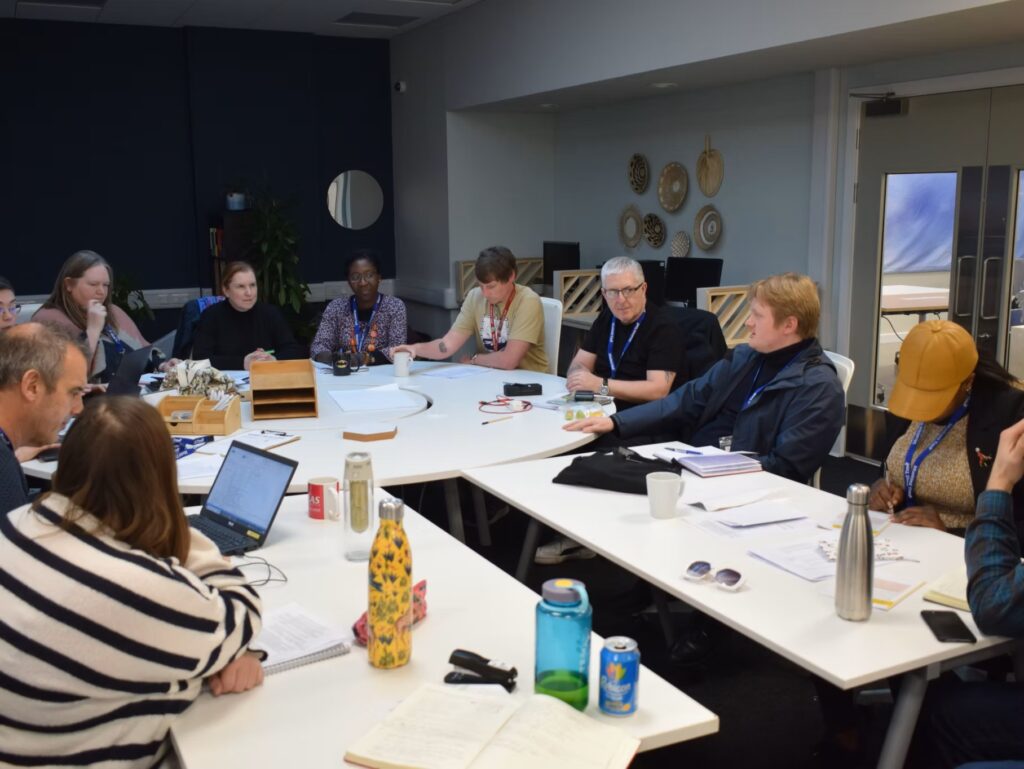
These new targets were a key focus for the Manchester Social Housing Commission, which has MPCAN represented by members Sue Anya and Sheila Davies. The announcement represents a huge success on part of the hardwork and advocacy of community commissioners from Miles Platting, Hulme and Moss Side.
MPCAN age-friendly and action groups are going from strength to strength and their commitment to the community continues to benefit local residents in Miles Platting and Manchester more widely.
If you wish to get involved, please email milesplattingcommunitynetwork@gmail.com
Follow MPCAN on Facebook for regular updates: https://www.facebook.com/milesplattingcommunityandagefriendlynetwork/
A Big Step Forward

Social Homes for Manchester are pleased to announce that Manchester City Council (MCC) passed a motion last Wednesday 16 July to increase social and affordable housing targets in the city.
Moving away from the 2012 policy where only 5% of new housing developments of 15 homes or above had to be social or affordable rents; MCC have now voted for a new set of targets under which 21% of new housing developments of 10 homes or above must be social rent.
The original motion was brought by the Lib Dems after a Green Party amendment to a motion in February 2025 endorsing Social Homes for Manchester’s ask for 30% social rent was not agreed by council.
The new city policy will require 30% of all new housing developments of ten homes or more to be ‘affordable housing’ of which 21% should be social rent homes, a further 3% is to be Manchester Living Rent (which means within the Local Housing Allowance threshold), and 6% is to be low-cost home ownership options.
The new targets were a key focus of discussion at the Manchester Social Housing Commission on Thursday when Community Commissioners from Miles Platting, Hulme, Moss Side, and Wythenshawe thanked Executive Member for Housing and Development Cllr Gavin White and all elected members for listening to community concerns on the housing crisis:
“Last year when I walked in this room, I just thought no, it’s just going to be a load of talk, and nothing is going to change. But listening to the discussion around this table now, I just can’t thank you enough for all the hard work that you all do. Thank you on behalf of all the residents, and all the communities.” Zoe Marlow, Wythenshawe Central Network.
Councillor Gavin White said:
“We were pleased to see the council giving unanimous support for our view that 30% of our housing delivery should be affordable with 70% of this being for social rent. We all want to see more social, council, and genuinely affordable housing in our city, to tackle the housing and homelessness we face.
It has been good to engage with and listen to the social housing commission over the last year and ensure that our ongoing response and strategy as a council is truly ambitious to meet the needs of our city.
We are pleased to see the recent announcements by the Labour government of £39bn for new social and affordable housing over the next 10 years, with 60% of that being for social rent – we are already in discussions with government about how we can help with the accelerated delivery of these new social and affordable homes in Manchester.”
Next steps
The local plan with these revised targets and policies will be subject to an 8-week public consultation from mid-September 2025. While recognising this big step forward for the city in addressing the housing crisis, for Community Commissioners and the Social Homes for Manchester coalition, concerns remain about what this will mean in practice.
1. The evidence tells us that 32% of new build homes must be for social rent to address the housing crisis across GM.
Robust research into the housing crisis across England provides clear evidence that we need to deliver 32% social rent across Greater Manchester.[i] The Commission’s own evidence highlights the cost savings social rent achieves for government and how social rent is the only tenure that can address the crisis of more than 4,500 children in Temporary Accommodation and nearly 20,000 households on the waiting list for a social home in Manchester.
2. There is a groundswell of political will to build higher levels of social rent, and this is reflected in large increases in national grant.
21% social rent is a big step forward that should be celebrated, but we know that what we really need in Manchester is a minimum target of at least 30% social rent. MCC have been making great progress towards building higher levels of social rent even before Rachel Reeves announcement of £39 billion for social and affordable housing, and Angela Raynor’s follow up call for 60% of the homes delivered to be for social rent.
One example is the development of 69 low carbon homes with 100% available for social rent. Another is the planned development on the former Boddingtons site which is set to include 60% affordable housing including 22% social rent with 55% of this funded through grant and 5% funded through Section 106 contributions.
With such a significant increase in national investment and so much political support for social rent delivery at national and city-regional level, why not aim higher?
3. Developers must pay their share
Increased grant rate should not be an excuse for private developers making millions of pounds in profit to avoid a fair contribution to public benefit in the city.
Our comparative table of a range of English cities shows that historically in Manchester developers have been given a free ride when it comes to making contributions for social rent delivery.
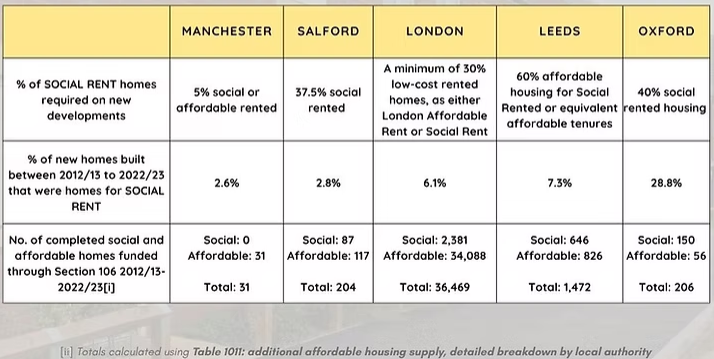
In addition to adopting a minimum requirement of social rent homes on all new housing developments of ten units or more, MCC have the power to set a percentage of social rent homes onsite of every new development, which then puts the onus on the developer to demonstrate through transparent viability if this is not possible. It also gives the local authority more weight in the decision.
This would help avoid viability loopholes that many local areas see when negotiating with big developers via Section 106/planning obligation agreements.
Developer contributions could also be used to retrofit existing poor quality/poorly insulated social homes on a case-by-case basis, which would, where implemented, mitigate damp and mould, bring down energy bills, and reduce carbon emissions.
4. Increased Planning capacity, transparency, and accountability
To maximise the delivery of ecologically sustainable social rent homes we need increased investment in funding for local authority planning departments and capacity building and training for local Planning Committees (something Oxford City Council have done to positive effect).
The Manchester Social Housing Commission are advocating in partnership with others across the country for the protection of community voice and the voice of elected members in planning decisions through the retention of powers of local Planning Committees.
These committees and our Planning Officers need training and capacity building to enable them to understand the complexity of planning issues; to hold developers to account for their obligations; and to implement and enforce planning conditions through to the end of a development process.
All too often developers negotiate their way out of the conditions placed on their planning applications citing a lack of profitability using ‘viability assessments’ compiled by expensive planning consultants.
This must end, and Commissioners continue to work with Lords and MPs to push Government to recognise that they must close the viability loophole and invest in local authority planning departments to ensure they have the expertise, time, and resources to hold developers to account.
Locally, Social Homes for Manchester are asking MCC for a new set of Planning Transparency pages on their website to enable communities to search by ward and at city-scale for local area data on housing need; active planning applications; and levels of social rent requested and delivered through both Section 106 and other forms of investment.
Manchester residents: please sign up to join the SH4M mailing list here.
Ward councillors: please make your pledge to demonstrate your support for a target of 30% social rent on all new developments of ten homes or more.
Manchester-based organisations: please demonstrate your organisation’s support for the six asks of the SH4M coalition – join the coalition here.
Our six asks:
- At least 30% social rent in all new developments of over 10 units.
- Stronger scrutiny and public accountability for the setting and enforcement of Section 106 developer obligations and to focus these contributions on the delivery of ecologically sustainable homes for social rent.
- Establish a Commission on social rent housing for Manchester.
- Develop a practical strategy for how to increase delivery of Community Led Housing and other community-led facilities including from donations of council-owned land.
- Develop a practical strategy for the renovation and transfer of empty homes into sustainable homes for social rent.
- Ensure all new build homes of any type or tenure are ecologically sustainable.
The Commission referred to under (3.) already exists and Commissioners are working hard to explore the evidence base and develop recommendations. You can read more about this at: https://www.socialhomes4mcr.org.uk/commission.
[i] Bramley, G. (2024: p.69), Housing Requirements in England Revisited. Heriott-Watt University https://pure.hw.ac.uk/ws/portalfiles/portal/113960635/Bramley_G._HOUSING_REQUIREMENTS_IN_ENGLAND_REVISITED.pdf
Savings, Spaces, and Solidarity: Community Savers in 2024

We have worked together with Nifty Sustainability CIC on an in depth look at what Community Savers affiliates and partnerships are achieving through our community action with a focus on 2024. Below is an abridged version of sections from Nifty’s excellent independent evaluation report – its a great read!
Download our 2024 Impact Evaluation here
Inputs
Community Savers members and leaders bring their time and expertise, life experience, willingness and enthusiasm to the alliance, and CLASS works hard to ensure these are valued and meaningful. CLASS supports Community Savers to develop capacity, knowledge and skills. CLASS nurtures community leaders and creates social and strategic spaces for reflection, learning and relationship building such as the annual retreat. The Community Savers–CLASS alliance is genuinely effective with transparent and authentic leadership and co-governance structures. CLASS also bring a helpful legitimacy to the groups, as well as technical support.
“CLASS come to you. There are other charities out there that support people, but you have to go to them. What’s happened with CLASS is that they meet on your patch, listen to what you need, don’t parachute in, and help you to see that you’ve got the skills amongst you, you’re the experts in the field and it’s just about bringing that voice out really.” Leader interview

Action
Community Savers and CLASS are leading on a variety of innovative activities. However, the building blocks remain the women-led and community-based savings clubs. These are an adaptation of a 30-year strong social movement called Shack/Slum Dwellers International. Stemming from and galvanised by the savings groups, there were no shortage of precedent-setting projects, partnerships, neighbourhood networks and campaigns to explore including Ageing Well in Place in Hulme, Miles Platting Community and Age-Friendly Network, Women of Wythenshawe, and Social Homes for Manchester. These are all underpinned by community priorities and participation and facilitated by CLASS and partners. In addition, community-led learning exchanges lead to knowledge sharing, capacity building and new relationships.

Outcomes
The alliance of Community Savers and CLASS, their approach and their activities are leading to a range of positive outcomes at the individual, neighbourhood, and city-regional scale, which would not otherwise be possible.
Members have more savings, less debt, more resilience to financial shocks
The number of affiliated Community Savers groups/neighbourhood networks remained at 8 in 2024 during a period when CLASS was also coordinating community action of nine member groups in the Women of Wythenshawe network. The numbers of individuals and leaders increased, as did savings turnover both in terms of deposits and withdrawals.

61% of members survey respondents said they would have spent the money they saved through the savings club on other things, and many of these said they would have wasted it on ‘rubbish’ and things they didn’t need and that the savers groups were valuable in reducing this. 52% of members survey respondents said that being a member of their savings group had changed the way they think about how to manage money.
“I’ve never saved before I joined the Dandelion Savers. For more than 2 yrs now, I’ve realised how you can save money. I have £1000 in savings now.”
Leaders have increased skills, employment and personal development opportunities
It is clear from the data that being involved in Community Savers and CLASS work is leading to positive impacts around knowledge and skills, and personal development opportunities. Throughout 2024, Community Savers and Women of Wythenshawe leaders engaged in ongoing skills development from the basics for running local groups like financial management and accounting; health and safety; first aid; and building an inclusive approach for people with diverse needs; to safeguarding, mental health and neurodiversity; and understanding incorporation.
Members have improved mental and physical health

These impacts were reportedly as a result of, for example, having somewhere to go, people to meet, speak to and share problems with, and feeling accepted as part of a community.
“I used to be a recluse and didn’t come out of my flat for 10 years and then I found out about this place and started coming here 7 months ago. If i don’t come here for a week, then come the week after, people say ‘where’ve you been?’ It’s nice to know you’ve been missed.” Savings club member
“I would like to say a massive thanks to Wow for giving us the opportunity to learn new skills that will help us grow and helping us believe that we can make a difference, and to empower us to encourage and inspire others to do the same. WoW is the best thing that has happened to Wythenshawe. Together we are stronger.” Women of Wythenshawe Leader

Increased access to community facilities
The importance of community spaces and facilities came through strongly and some important milestones were reached in 2024 around spaces that Community Savers and CLASS are involved with.
Mums’ Mart finally signed the lease on a derelict caretakers flat in a local church enabling the renovation to get underway. The space was co-designed by local mums and will be free to use for local women’s groups for the next ten years. Miles Platting Community & Age-friendly Network have successfully registered a new CIO, in partnership with St Cuthberts C of E Parochial Church Council, called St Cuthberts Communities Together with a joint vision for a multipurpose faith and community hub. And in Hulme, One Manchester are renovating a 3-bedroom ground floor flat and a caretakers room into tenant-governed community spaces for residents of Hopton Court and Meredith Court tower blocks.



“This community has been stripped of all its assets – the swimming pool, the library, you name it, it’s gone. But now we’ve got so much hope that through St Cuthberts Communities Together we can have a space where we can socialise, worship, maybe space for the NHS, maybe some housing. Big plans! And CLASS helped support us with that” Leader interview – MPCAN
Women of Wythenshawe
The Women of Wythenshawe network is doing amazing work and being part of the network is having positive impacts on people’s confidence to act on their ideas. Groups and organisations are working together more which means signposting can be effective between groups and services. WoW have united around four priority areas for community action on gendered poverty – domestic abuse, women-led social enterprise, SEND education and social housing provision.
“CLASS have done something very unique I think. Because they have spoken to the local women about what the needs are. So, you know the big ones are housing, disability, domestic violence, and they’ve looked at those and it’s three separate groups because it’s three separate issues. However, they’re all interconnected but you almost can’t have this big umbrella of going ‘right let’s deal with them all’ because every one takes such a lot of knowledge, experience, time. So, by having the three and then pulling them together we can all help each other. So, the housing team are fighting for better housing and accommodation for disability but also for women fleeing DV… So we’re all working together” Partner interview
The work on housing was a catalyst for the development of Wythenshawe Central Network which has become the legacy structure for Women of Wythenshawe. Wythenshawe Central decided to affiliate with the wider Community Savers network in October 2024.
“I’m most proud of the connection we have made with so many women in Wythenshawe and the Wythenshawe Central Network that has come out of it. And now we are engaging the community in the development of the town centre. It feels like we are the bridge between the developers and the community and sharing all the information.” Leader interview

Social Homes for Manchester
The Social Homes for Manchester campaign coalition was catalysed by Community Savers mobilisation in 2023 and launched the Manchester Social Housing Commission chaired by the Bishop of Manchester, Dr David Walker, in 2024. The Community Savers leadership felt they had reached a stage of development where they wanted to join their voices together across the city. Together with partners, they have made the following six requests of Manchester City Council:
- At least 30% social homes included in all new developments of over 10 units to be enacted in local policy and enforced through the setting and enforcement of section 106 obligations.
- Stronger public accountability and scrutiny for the setting and enforcement of developer obligations to build new social housing
- Establish a Commission on SocialHousing for the City of Manchester.
- Develop a practical strategy for thepromotion of Community Led Housing.
- Develop a practical strategy for the renovation/transfer of empty homes into homes for social rent.
- Ensure all new developments are climate and nature friendly

Community Commissioners are a core part of the process and include women of different ages from different parts of Manchester and those who have made Manchester their home from different backgrounds. They are the ones who have been organising in their local areas and encouraging people to talk about the issues that are affecting them, and they are shaping the agenda of the Commission for example by making sure housing provider accountability and scrutiny is included alongside increased numbers of social housing. They bring diverse experience and expertise into the room and add weight and legitimacy to the process.
“The fact that we’ve got people from the communities sat on the coalition and the Commission – but particularly the Commission – alongside some incredibly influential individuals. I think that speaks for itself.” Partner interview
Join the mailing list and/or become a member of the coalition here
“I’ve learned where to go, and who to approach, and what to say to the people that we are asking things from, whereas two years ago I wouldn’t have had a clue about any of what we are doing now. I’ve learned how to understand the jargon, how to approach things, how to be in the room with so many highly qualified people, but feel that I belong there which is very important because people like me don’t usually feel they belong in that room.” Leader and Community Commissioner, Wythenshawe
In November, Community Commissioners Thirza of GM Tenants Union and Zoe of Wythenshawe Central and Dandelion Savers gave powerful testimonies in the House of Lords to launch the Commission’s five urgent national policy asks. And residents and community leaders from Hulme, Miles Platting, Moss Side, and Wythenshawe have drawn on several years of local organising as well as more recent community workshops September-December 2024 to draw together local priorities for housing and local development. They presented these priorities to senior officers in Manchester City Council’s Planning department in January 2025 in anticipation of the new Local Plan for Manchester in 2025.
“The booklets we’ve produced have been helpful for when I’m talking to our local members about things in their ward and when social housing projects come up… the Commission has articulated the evidence across the city… I work with all the Councillors to make the case for that. So I think the Social Housing Commission has helped with that evidence.” Commissioner, Manchester City Council
“When someone living in social housing expresses something related to whatever that topic of conversation is, people really switch on and listen because I think most, if not everyone else at the table doesn’t live in social housing and I think it’s important to kind of counterbalance this sort of abstractness of policy by having that real world perspective to ground us.” Commissioner interview
Learning and Next steps
CLASS and Community Savers have carried out extensive reflection and learning together throughout 2024 enabling them to develop a new three year strategic plan which is available for download. This sets out the current organising context they are negotiating and a series of strategic objectives and priorities for 2025-2028.
The Community Savers groups are having positive impacts at member, household and group levels around saving money and building financial resilience, as well as connecting members of the community, reducing isolation and supporting wellbeing. CLASS is meeting these groups ‘where they are’ and working with them to explore relevant opportunities for skills, knowledge and capacity building, which is developing confidence and encouraging members to develop local activities and interventions to make their communities better for those that live there. CLASS is also working hard to develop partnerships with organisations that have shared values around relevant issues such as social housing, domestic abuse and ageing well to focus on progressing these agendas together.
“CLASS have actually pulled together independent groups that were working in silos and brought them together as a unified group.” Partner interview
All the while, ensuring community voices are being meaningfully included in conversations and governance spaces, which is valued across the board.
“I think it’s important that there are groups that can help give a voice to people but also help organise so that in terms of the formal levels of governance locally and nationally there is a place round the table for everyone.” Partner interview
Positive feedback loops are developing whereby Community Leaders feel more confident and empowered through having their voices heard and their place at the table and so are creating and leading more ambitious agendas for change.
“…it’s genuinely innovative, and I genuinely believe that if more communities have this opportunity you could start to see a profound shift in the voice and power and democracy that communities have. But it’s more than that, because the way CLASS do it, they really engage with the council and other services and make these services listen to tenants and engage with tenants. I don’t think you could ever really capture the impact fully of how this approach influences the culture of the sector.” Partner interview






CLASS and Community Savers are delighted with Nifty Sustainability CIC’s evaluation of our work and impacts in 2024! With the chancellor’s announcement of £39 billion for social and affordable housing on 11th June it could be that the hard work of housing justice coalitions across the country may be about to pay off. But the devil will be in the detail. What is needed now are clear targets for what proportion of new build homes will be developed for social rent!
The Untold Stories of Manchester’s Housing Crisis

Tenants need to join forces across Manchester neighbourhoods. This was the key message arising from SH4M’s first film screening and campaign workshop at St Cuthbert’s church in Miles Platting in February.
This was the first in a programme of events that will take place across the city throughout 2025.
What is the City but the People? is a short film co-created by two inspiring women leaders from Moss Side and Wythenshawe to raise awareness about the urgency of the housing crisis across the city.
MPCAN (Miles Platting Community and Age-friendly Network) were the first coalition to host the SH4M campaign to screen the documentary and raise awareness with their local community about easy and urgent actions they themselves can take to support the collective effort to get more social rent homes delivered across the city.
A key focus of the current work is the new Local Plan which will be published for an 8-week consultation in Summer 2025 by Manchester City Council.
Download our Local Plan Handbook here
Download our Campaign Information booklet here
Planning can be very technical and boring! But if you were ever going to engage in planning this is the policy to wake up to! The Local Plan will determine how much housing, what types of housing, and where housing will be developed across the city for at least the next ten years.
Councillors Carmine Grimshaw and June Hitchen were in attendance and promised to add their pledges in support of our headline campaign ask which is for 30% of all new housing developments of 10 homes or above to be homes for social rent. You can view the full list of which councillors have pledged their support here.
You can invite Social Homes for Manchester to come and fun a film screening and workshop in your local area – just email socialhomes4mcr@gmail.com.
Launch of the Manchester Social Housing Commission

The Manchester Social Housing Commission held its first meeting in July bringing Community Savers leaders together with cross-sector experts to develop local and national proposals for addressing the housing crisis. The Commission is chaired by the Right Reverend Dr David Walker, Bishop of Manchester and supported by the Social Homes for Manchester campaign.
Community Savers representatives from Collyhurst, Miles Platting, and Wythenshawe advocated for 30% of all new housing developments of ten homes or more to be social rented homes that are climate and nature friendly. They also asked housing sector professionals to stop using the term ‘affordable housing’ and refer to housing for social rent or private rent. Communities often think affordable means social, and it prevents them holding developers and the council to account for building the social homes we need.
Zoe Marlow of Dandelion Savers and Women of Wythenshawe said:
“We need to stop blurring the line between social homes and affordable homes and just say which one is which. People are confused.”
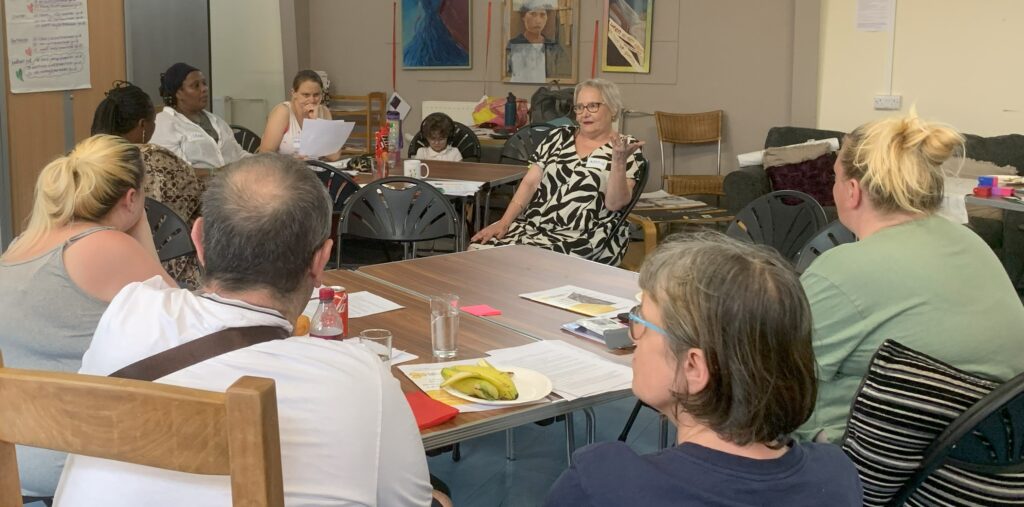
The lack of information provided at a community level about developer obligations, or ‘section 106’ contributions, was also raised and Commissioners discussed the need for a review of viability assessments which developers use to avoid these obligations on grounds of low profitability.
Sue Anya of Miles Platting Community and Age-friendly Network (MPCAN) said:
“We need to know where the section 106 money goes. It doesn’t seem to get invested in the community where construction is happening…We also need to have information much earlier – we never find out what is happening until everything has already been decided.”
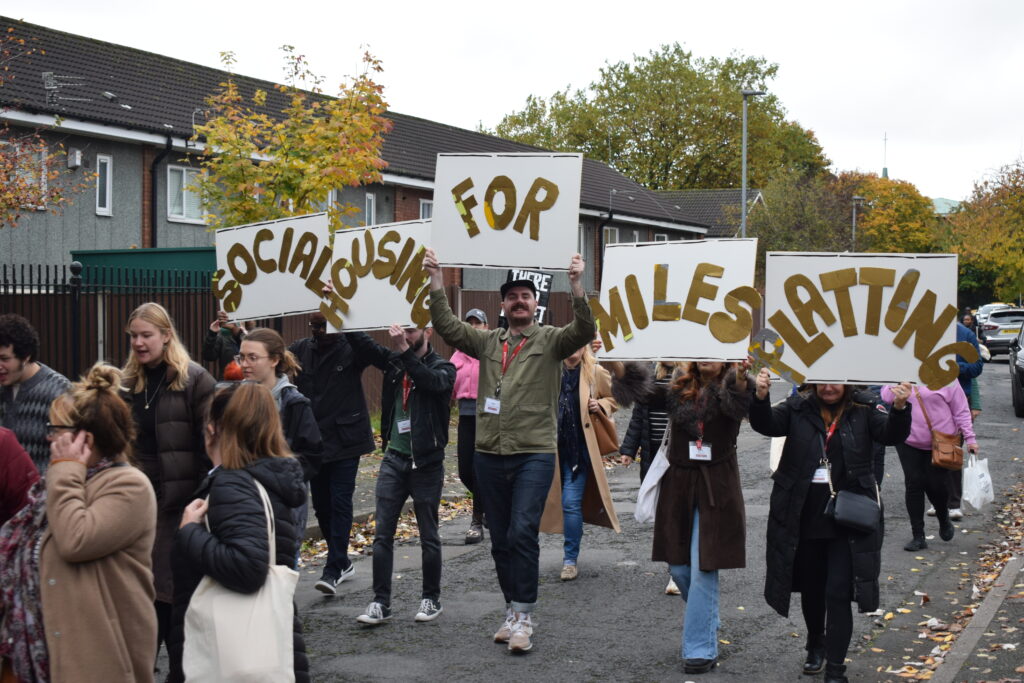
Families in lower income areas of the city also depend on their own family and social networks for childcare and social care support but Sheila Davis of MPCAN highlighted how children and grandchildren of existing residents are unable to find a social rental home in the same area and can’t afford escalating private rents. Flats let at “affordable rents” cost 80% of market rent but there is no cap on market rent, so these offer no solution to people working for minimum wage or even the ‘living wage’.

Sheikha Omar of Moss Side Tenants Union called for the complete banning of Section 21 evictions, the application of Freedom of Information legislation to housing associations not just local authorities, an end to the sale of social housing to private equity companies, and better controls on rent increases for both social and private tenants.

The Commission will be making policy proposals to Manchester City Council and to the new national government administration in the coming weeks and will be developing the detail of their recommendations over the next 12 months. Community representatives on the Commission will be working closely with the Social Homes for Manchester campaign coalition to organise neighbourhood-based briefing sessions across the city, raising awareness about housing and planning policy and ways to work with local councillors to secure better outcomes for their local area.
Social Homes for Manchester is a coalition of community associations, charities, think tanks, academics and social justice organisations focused on accelerating the number of social homes that are created in Manchester by 2030 and ensuring this is done in an environmentally sustainable way.
Spotlight on Miles Platting Savers
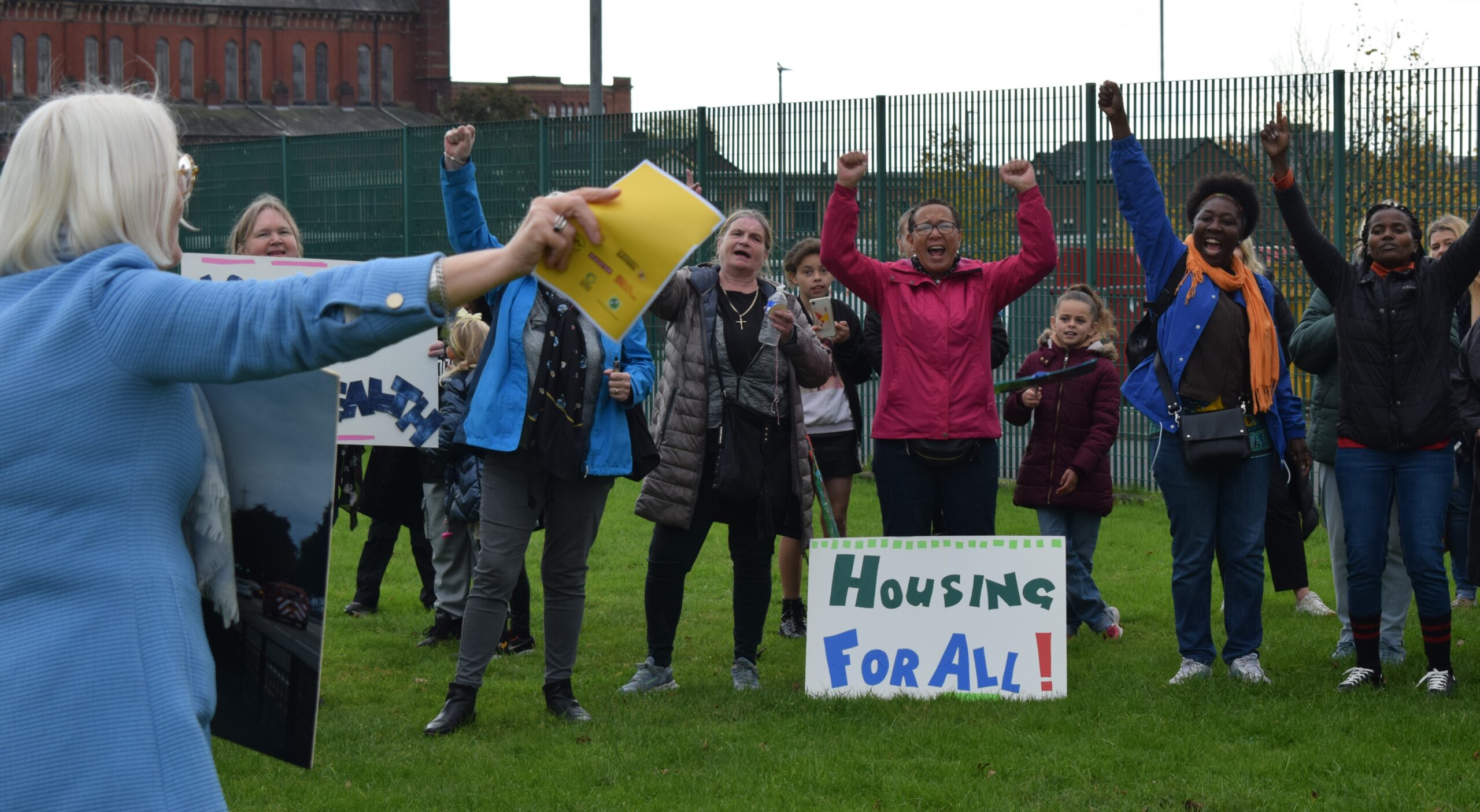
Read our interview with Dot, Committee Member at Miles Platting Savers, find out about one of the original groups in the Savers Network that is still going strong!

Can you tell us a bit about Miles Platting Savers? When did you start, where and how
often do you meet? How many members do you have?
About 5 years, we meet once a week at the coffee morning at the Church of the Apostles in
Miles Platting. We have about about 20 regulars and 30 savers in the group. We have a mixture of people who come to coffee morning, young and old.
As a group, what would you say are the main benefits for the individuals who save with
you?
It gives them a bit of extra cash to buy stuff they need, people are saving for uniforms,
Christmas and even holidays. I think most of the time you’re saving for something you think you
can’t have, then you realise if you save a little bit you can. There’s definitely a social side to it.
Most people are part of the coffee and some are visiting the social supermarket and they are
savers too. We definitely go in, have a cup of tea and have a chin wag and a catch up.
Has working with the other groups helped Miles Platting Savers to develop, learn, expand
or do things differently?
I think so, we see how other groups do theirs and then think if it works for us we can have a go.
I think it helps just to talk about what other groups are doing.
As well as the savings group, are Miles Platting Savers involved in any other community
projects and what are the impact of these?
We are members of MPCAN (Miles Platting Community and Age-friendly Network) – there’s loads of stuff going on thinking about the community building, the green spaces. I haven’t been to all the recent meetings due to my health but they let me know what’s happening.
What can we expect to see next from Miles Platting Savers next – does the group have
any plans for the future?
There’s a day trip planned to go to RHS Bridgewater so we can go there together in June. May
Fairweather from Talk about Money is going to come in to teach all ages from children to adults
how to save a bit and where to save. They are trying to get the people who use the community
shop (Social Supermarket at the Apostles) who have got kids to get involved, because I think if
you teach the kids the kids can teach the adults. I think that the Talk about Money sessions will
be a good way to get people to come in with the idea of getting the kids to teach their parents to
do a bit of saving.

To find out more check out the Miles Platting Savers page here: https://communitysavers.net/project/miles-platting-savers/
Community Savers Leaders visit Kenya
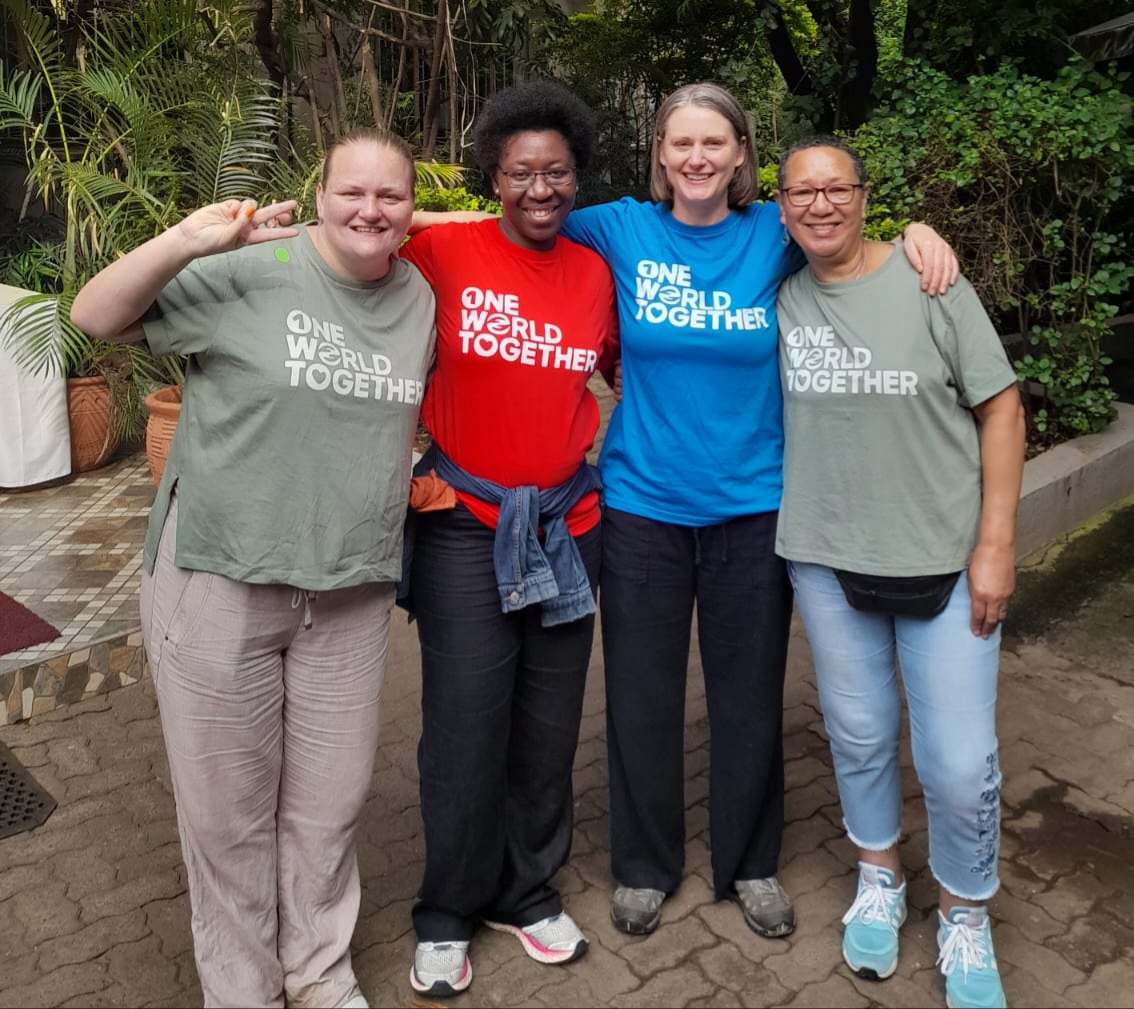
In January 2024 some of our Community Savers members visited the first One World Together summit in Nairobi and took part in a learning exchange.
SDI Kenya hosted One World Together and four community partners – Muungano wa wanavijiji, Community Savers, Raising Futures Kenya, Play It Forward – at their headquarters in Nairobi, Kenya.
Community Savers, Helina and Zoe from Dandelion Savers and Dot from Miles Platting Savers attended and these are some of their reflections on the experiences they had whilst they were there.
Dot
You recently went on the learning exchange to Nairobi…
Can you tell us a bit about who was there, where you visited and the connections you made?
We were there with One World Together and visited the SDI Kenya offices and Play It Forward plus 4 informal settlements, Kibera and Foundation of Hope. We went to a school, it was brilliant. They have just come off the street and may have been involved with crime and violence and have a 7 week course, waking them up to what they can do to turn their lives around.
We spoke to a woman called Christine about their savings group, that was brilliant, she was so great. it’s different there, savings groups are different for them even though there are similarities theirs are so much more powerful because they are working on sanitation and water and healthcare and these are the kind of things we’ve already got and take for granted.
Why do you think community exchanges are important?
We can learn from each other I think that’s really important and it gives you a fire really, you’d see and meet different people and have a different look on stuff that you don’t even think about really because you’ve got everything it wakes you up to realise that we need to start kicking arse to get stuff done. We’ve really got to start kicking arse, in a nice way.
We went to the Raising Futures Kenya training centre
Was there anything you learnt / saw that you want to bring back to your community?
Yes a bit more fight, and because they live in tin shacks and can hear everything that goes on. We have to knock on more doors to get in to find out what is going on in people’s lives. They were horrified to learn that there are people who died in their places in the UK and could be there for weeks or even months and nobody knows. Whereas they live that close together that they know everything and they know everybody’s business.
Did you identify any common challenges between the groups?
Yes it’s about getting people together really you know they have their own ways and they do say if you don’t come to the meetings you won’t be involved in what they are achieving. You can’t expect that if you don’t put anything in to get anything back. What you give you get back, I’ve always said that.
In three words, can you describe the overall experience?
Emotional, exciting and inspiring

Zoe
You recently went on the learning exchange to Nairobi…
Can you tell us a bit about who was there, where you visited and the connections you made?
What stuck with me was the Foundation of Hope and Florence’s Raising Futures Kenya and the Community Savers itself at Muungano wa wanavijiji. I loved everybody and I connected with the women that were there. There was a lady called Emily. She stuck in my heart and she fights for everything her community needs.
Why do you think community exchanges are important?
Mostly it’s the experience, we all have different life experiences and sometimes we look at other peoples problems as not a problem. We were talking and one of the ladies said ‘but you don’t have poverty’ and it was important that I was then able to share my story of my poverty and I said that our poverty isn’t the same but the way we deal with it is the same, we want the same outcome. She then realised you do have poverty over there (in the UK) and I learnt from her ways to deal with poverty. I learned how important that community is and how important it is to never give up. It is really important so we can learn from each other and watch each other grow. Now I’m looking forward to seeing what all the other organisations are going to do and I get to share in that even though I am on the other side of the world. I get to share in the wonderful things they do. I get to see it.
Was there anything you learnt / saw that you want to bring back to your community?
Yes I want to bring back the actual meaning of community. I want to help and include more people and encourage more people. The data collecting was really important for me. I think that’s great because we can do that here in our local community where we are, we can ask people, we can do interviews and find out what people actually do want, not what we think they want and help out in that area.
Did you identify any common challenges between the groups?
Red tape was big one when we want to do so many things but we are having to jump through hoops, all of us felt our governments aren’t working for us and the fact that a lot of us are women so that’s a challenge in itself but they (the Kenyans) are not letting that be a challenge they moving forwards they just don’t stop. I think essentially we all want the same thing. We all want our communities to be better, happier and healthier.
Did you share anything about your group / community / approach that you think was of particular interest to the other communities?
They were fascinated by the food bank side of it, they wanted to learn more about that. I told them about our poverty side of it so that made them feel like it’s not just us. I hope they feel inspired the way I feel inspired.
In three words, can you describe the overall experience?
Educational, inspiring and life-changing.
I feel like my whole perspective on life has changed. I was getting complacent. I was like I can’t change these things so why bother and now I’m like actually it starts with me and it starts with us. We can just sit around waiting for people to do it. I feel like I want to change the world and go to Zambia and Uganda! Talking to Play It Forward they had an example of a young boy who was hitting his Mum and the whole table started crying as that was what I was going through. It was great to know that when mum’s are going through this they are getting support and I feel grateful that Play It Forward were there to help her. It’s so difficult to get the right support to know that it is going on and to know that these mum’s are being helped is amazing. I love everybody.

Helina
You recently went on the learning exchange to Nairobi…
Can you tell us a bit about who was there, where you visited and the connections you made?
This was a fantastic two day conference when One World Together got to know their partner organisations and vice versa, sharing stories of their successes and knowledge gained from running their local community groups.
We visited Muungano wa wanavijiji in Nairobi and Muungano’s Foundation of Hope in Kibera a meeting was organised with the Community Group of women and Leaders, who willing and lively shared their experiences of running a Community group on their Slum Dwellers Settlements and the highs and lows of growing their membership and the 3 years training involved in being an effective community leader.
We visited another Muungano wa Wanavijiji, Nairobi, Kenya. Shack/Slum Dwellers Settlement (Nancy Njoki Wairimu local area/home town), a meeting was organised with the leaders of a Community Groups, both men and women. Again another informative learning exchange took place and the highlight was being informed about the bottom up planning programme called Mukuru Special Planning Area.
Then we also went to Huruma and were shown around the homes that the community are building for each other. We were shown around one of the Muungano members homes. In all purposes it was a modest home, filled with modest equipment, yet amazing to see in all in glory, as this was a home build by the Muungano community members , (through community savings) including the making of building blocks from cement to build the walls, in partnership with Nairobi County Government and Muungano. With planning permission the people/community avoid eviction.
We also learnt about the importance of collecting community data. They shared with us the importance of how they have been collecting data on structure and households within the settlements. They create a data profile of problems faced by the people in the settlements, all of which are collected, collated and presented to government officials, to evidence that they exist, (the slum dwellers are ignored by government official, as they are told they do not live in areas with planning permission) and the problems they are facing and the support to solve the problems they need as citizens of Kenya.
Why do you think community exchanges are important?
The community exchanges, including overseas learning exchanges, are a good idea for a leader to visit at least once, if able, as they create solidarity with other women leaders. SDI have been around for 30 years, and are made up of these women-led saving schemes, which is a global network. It’s good to learn from them and to see what women-led saving schemes at neighbourhood/community level can achieve. Sometimes you just need to hear it and see it from the horse’s mouth to believe it.
Did you identify any common challenges between the groups?
Yes, in discussion we identified common challenges between the groups. It was important to create volunteering opportunities for the community. Everyone has some talent to bring to the community.
– Committee leaders can be overcommitted.
– Members of community groups and Savers groups can find it difficult to engage them/mobilise them in other ongoing campaigns.
– Growing a membership is difficult and requires effort by committee leaders. Everyone tries to save something in Kenya (there is no welfare state system).
-Mainstream media and the local media do not turn up for local events.
-Media do not show the true story/images of the urban poor/Shack/Slum Dweller, only show evictions and negative images.
They use Twitter, Instagram and have created their own YouTube Channel called Know Your City TV (KYC- TV) to tell their own story.
Did you share anything about your group / community / approach that you think was of particular interest to the other communities?
We emphasised that there is poverty in the UK, we emphasised that there is isolation in the UK and that people may not talk to anyone for weeks, months and can die from loneliness. So Savers groups are a tool to bring people together, to bring about volunteering opportunities.
We reminded our partners that people do sometimes have to make tough decisions in their household, due to poverty some household do not turn on the central heating in winter or just warm one room, many household do not eat fruit and vegetables as they are expensive to buy – yet the government guidelines is to eat 5 fruit or vegetables a day. Households where someone is working still do not always have enough money to eat three meals a day, parents go hungry, their children go hungry, people are poor and suffering due to the Cost of Living Crisis in the UK.
In three words, can you describe the overall experience?
Together!, inspired and motivated

Social Homes for Miles Platting Now!
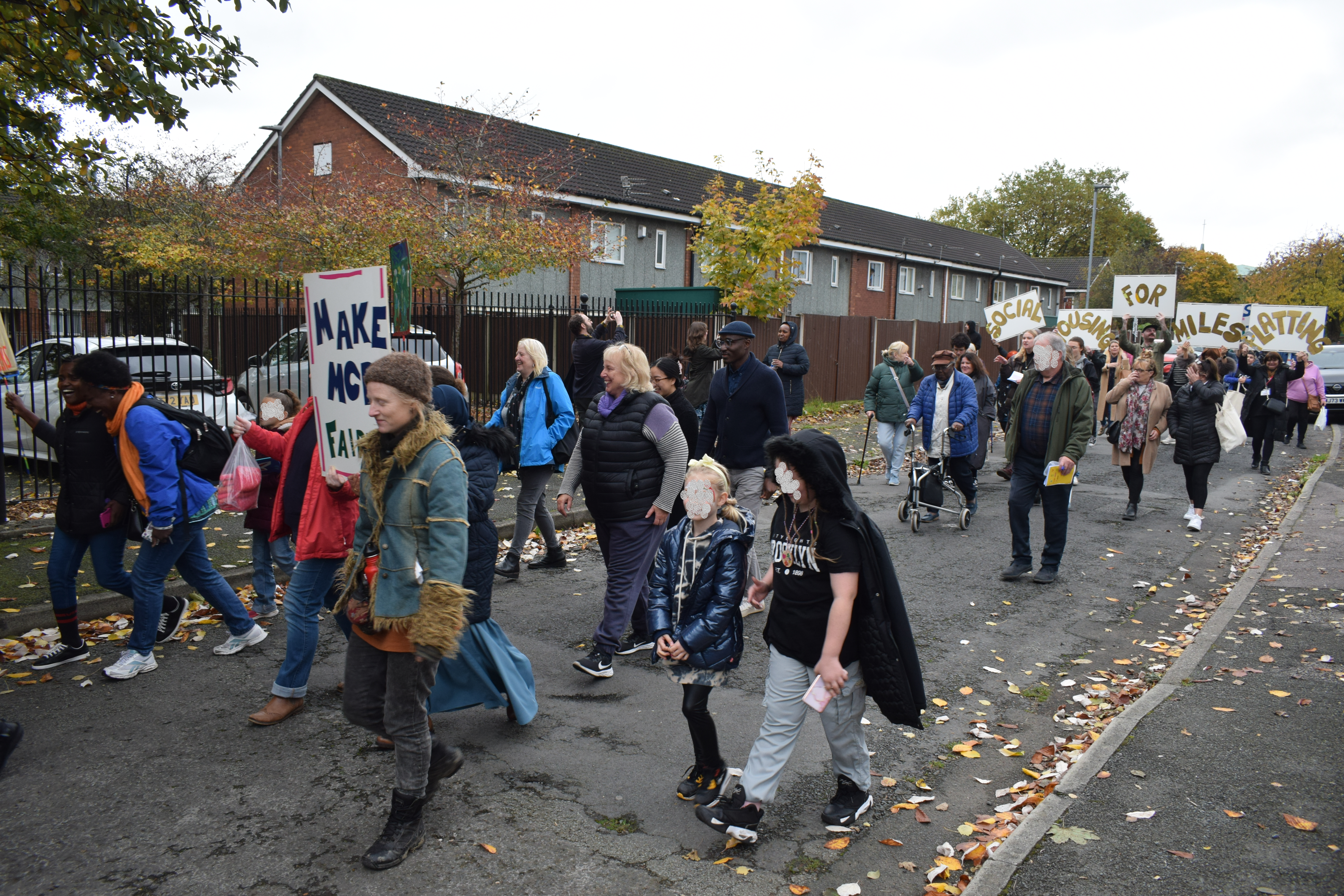
Miles Platting, Ancoats, and Collyhurst residents were out in force on Saturday to call for social homes to be built on a plot of land that has long been earmarked for community benefit.
Over 180 people attended the MPCAN family fun day where members also launched a city-wide campaign for more social homes to be built or brought into use across Manchester amidst a housing crisis in which more than 15,000 households are now on the waiting list for social housing in the city[1].
The Miles Platting PFI regeneration was justified to residents on the basis that there would be a Joint Services Centre providing a suite of NHS services and a Community Hub built at the intersection of Oldham Road and Varley Street behind the current location of Jigsaw Homes offices. This is the site where MPCAN leaders are calling for social homes to be constructed.

The Joint Services Centre was to include three GP practices; a pharmacy; chronic disease management, maternity and children’s health services; drugs misuse and sexual health services; counselling and therapy services; and breast screening and minor surgery. The Community Hub was supposed to incorporate: a new library; new sports facilities; advice and information; services for young people; spaces for community, recreation; and leisure use; and community outreach services.
There was also supposed to be retail facilities and a replacement swimming pool.
These facilities were never developed, and the community have experienced a net loss of 502 social homes following the regeneration (with 240 homes lost to demolition and others through right to buy). Meanwhile, the neighbourhood has been transformed into a landscape of private housing for sale and rent, with no shops or infrastructure to support this new population, creating a food desert, where residents must take two buses to access a supermarket or swimming pool.
Social Homes for Manchester Now!
As well as calling for social homes in Miles Platting, residents launched the Social Homes for Manchester Now! campaign by a coalition of social and climate justice organisations including Friends of the Earth Manchester, GM Tenants Union, Greater Together Manchester, Mustard Tree, Shelter, and Steady State Manchester.
The new spatial framework for Greater Manchester, Places for Everyone, is in the final stage of consultation on modifications which include the removal of specific reference to building social housing (in MM7.5). The new Local Plan for Manchester is being drafted and is expected to be published for consultation in Spring/Summer 2024. Together these policies will decide Manchester’s planning strategy and housing targets for the next 5-10 years.
Social Homes for Manchester Now! are calling on Manchester City Council to take on six key proposals in the context of these new strategic developments which were launched for the first time by Anne Worthington, MPCAN leader and local activist, on Saturday:
Social Homes for Manchester Now! – Six key proposals:
- At least 30% social homes to be included in all new developments of over 10 units to be enacted in local policy and enforced through the setting and enforcement of section 106 obligations.
- Stronger public accountability and scrutiny for the setting and enforcement of developer obligations to build new social housing.
- Establish a Commission on Social Housing for the City of Manchester.
- Create a specific policy for the promotion of Community Led Housing.
- Develop a practical strategy for the renovation/transfer of empty homes into homes for social rent.
- Ensure all new developments are climate and nature friendly.
Download the Social Homes For Manchester Now! briefing to find out how you can Get Involved in this campaign!
Respond to the Places for Everyone Modifications consultation to object to the removal of specific reference to Social Housing in modification MM7.5 here.
MPCAN leaders are now working with other Community Savers affiliates across the city to bring residents together around this campaign and the plots of land in their own neighbourhoods that require Social Homes Now!
[1] There were 14,912 households on the social housing waiting list in Manchester in 2022 and this figure is now likely to be significantly higher. Live tables on rents, lettings and tenancies, Table 600: numbers of households on local authorities’ housing waiting lists, found at https://www.gov.uk/government/statistical-data-sets/live-tables-on-rents-lettings-and-tenancies. We would like to thank Dr Richard Goulding, University of Sheffield, for his support to MPCAN in accessing statistics, research, and information.